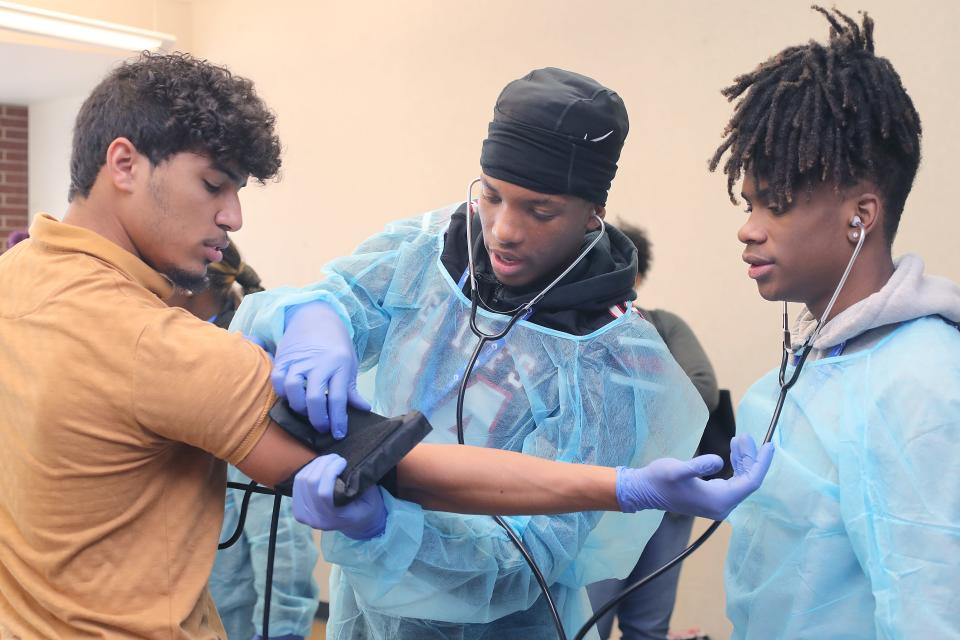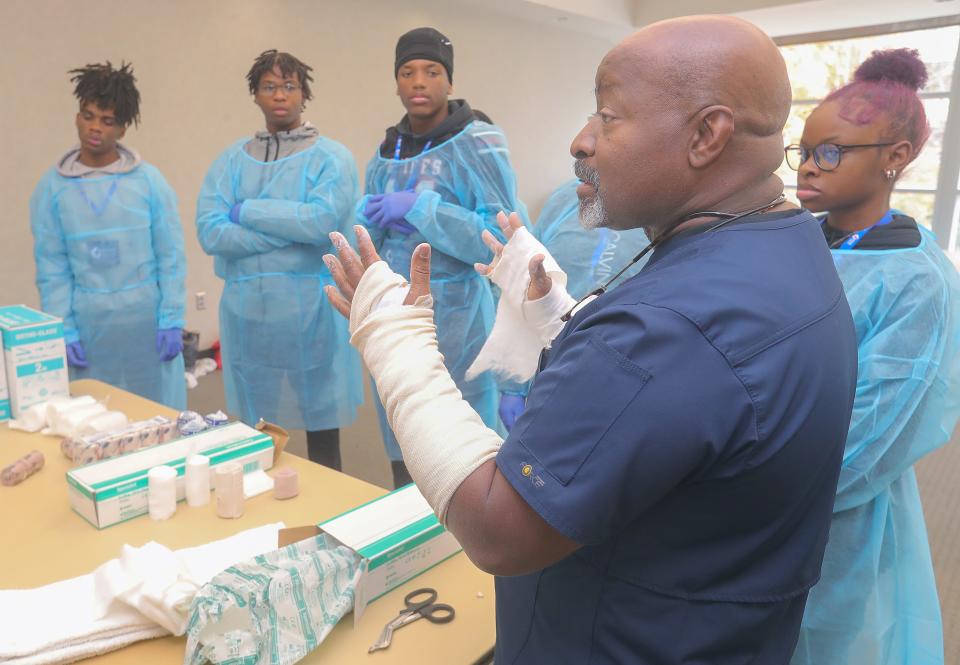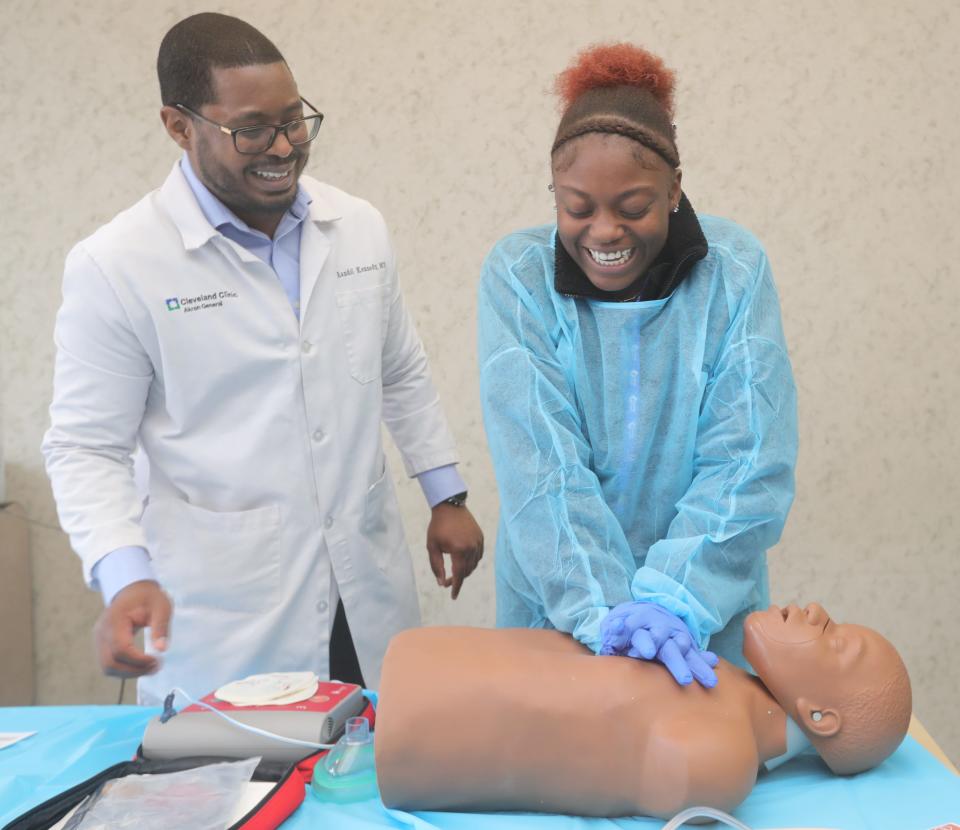Black doctors inspire high school students during hands-on event|Betty Lin-Fisher
- Oops!Something went wrong.Please try again later.
- Oops!Something went wrong.Please try again later.
Dr. Marcus Wooten stood on the stage last week in the University of Akron ballroom in front of about 200 area high school students and told a vulnerable truth: he didn’t get into medical school the first time he applied.
But he tried again, made it and was standing in front of the crowd as a doctor.
More:Racism in many forms can affect people's health: Here are some examples
In a chat later that day, Wooten, a third-year chief emergency medicine resident at Summa Health, later told me: “Kids need to know just because you’ve failed once, it’s not the end of the world. Just because you hit a hurdle, doesn’t mean you can’t go back and clear it after.
“Everyone fails. It’s just who is willing to get back up until you get it right,” Wooten said.
Support local journalism6 reasons why you should subscribe to the Akron Beacon Journal
The Texas native ran collegiate track and got good grades, but he didn't have a mentor or know that he'd need to prepare differently for the Medical College Admission Test (MCAT). While his grades were good, his MCAT score wasn’t competitive enough to get into any of medical schools he applied to.
He started working at a hospital and finding mentors and spent a year teaching students before getting accepted to the Howard University School of Medicine.

Wooten’s message resonated with many of the students who were attending the first Black Men in White Coats Summit last week at the University of Akron. The majority of the students attending were students of color and, in particular, Black students from Akron Public Schools’ Garfield, Firestone, North and Buchtel high schools. There were also some students from other area high schools.
All students who had an interest were invited, said local summit coordinator Dr. Yoleeta Ilodi, a Summa Health internal medicine doctor and geriatrician who also is the medical director for diversity, equity and inclusion. Ilodi and the other 20 to 30 mostly Black men and women doctors in attendance were particularly happy to see so many students who had a potential interest in medicine or the health field attend.
Several of the students told me throughout the day that Wooten’s message both surprised and inspired them.
Marie Cottrill, an English teacher at North High School who chaperoned about 22 students in the school’s Health and Human Services and Allied Health and Biomed program, said the day showed students different opportunities available to them.
She was sitting next to a student who was very inspired by Wooten’s admission.
The student said, “I’m afraid to fail and if he can do it, I can do it.”
What is Black Men in White Coats?
Black Men in White Coats is a national movement that started after a 2015 Association of American Medical Colleges report, which found there were more Black male applicants to medical school in 1978 (1,410 applicants) than there were in 2014 (1,337). The report also said the number of Black male students in medical school over more than 35 years had not surpassed the 1978 numbers.
The Black Men in White Coats organization partners with medical schools and health systems to encourage, mentor and inspire more Black men to become doctors.
Of course, this isn’t just about Black male doctors, said Ilodi, whose husband, Dr. George Ilodi, was also in attendance and is an internal medicine physician and medical director of the hospitalist program at Summa.
“We all support each other,” she said.
Ilodi spearheaded the local summit and said it was not hard to get commitments from Black colleagues from all Akron-area health systems. Physicians and resident physicians in training from Summa, Cleveland Clinic Akron General, Western Reserve Hospital and Akron Children’s Hospital were all in attendance. AxessPointe Health Centers and med school NEOMED also sent physicians and students.
Tracy Carter, Summa’s system director for government relations and health policy, moderated a panel discussion during lunch of eight Black doctors with several tables up front filled with more colleagues.
She marveled: “I have been in medicine for 30 years and I have never seen so many Black physicians in one room.”
Why is it important to have Black doctors?
Several of the panelists shared stories of being mistaken for custodians when they have walked into a patient’s room. One doctor said his high school counselor told him he should pick a different career choice when he said he wanted to be a doctor. So instead, he switched counselors and surrounded himself with people who would support and encourage him.
Many talked about the obstacles they faced without mentors to look up to or see people who looked like them. They wanted to change that.
In 2020, I did a series for the Beacon Journal looking at racism as a public health crisis. I shared stories about how people’s race has affected their health care. Black communities often don’t have the same access to health care as other communities. Many people in the Black community fear going to the doctor.
As part of the series, the Beacon Journal used a $3,000 grant I received and created a community panel to award mini-grants to grass-roots organizations helping to solve the issue. Readers responded and we handed out more than $10,000 in awards.
More:Betty Lin-Fisher: Meet the first-round winners of our Health Disparities Project
One of the stories I shared was of Dr. Carl Allamby and the challenges he faced. I’d already written once about Allamby earlier in 2020 after he was featured in national media stories. Allamby grew up in a poor part of Cleveland and said he didn’t know as a young Black man he could be a doctor.
More:ER doctor-in-training, former mechanic drives toward his goal
Allamby spent 25 years as a mechanic and owner of two auto shops before going to college and medical school. He was training in the emergency department at Akron General and is now a staff ER physician at Cleveland Clinic’s Hillcrest Hospital, close to where he grew up.
Allamby said he was thrilled to be at the summit last week with so many other colleagues and to inspire a new generation.
“So often when I was in school, it was the military who would come talk or they’d take us to prisons for a scared-straight program,” he said.
It’s important to be able to show young students, “that they can do it. They have seen people who look like them. Those kinds of things are just important for them to see,” he said.
More:'Something a lot bigger': Akron groups pay it forward to help each other and the community
The next generation
Damien Johnson, a junior at Buchtel high school, wants to be an orthopedic surgeon. He came to the summit with his sports medicine class.
Johnson, a wide receiver and cornerback for the Buchtel football team, hopes to play football in college.
If he doesn't play college football, he'll pursue his dream of being a doctor, he said.
"If football don’t go right, I can do this,” he said.

“You can do both,” I responded.
“Yeah, I think it’s going to be hard. If I do both, I think it's going to be hard. If I don't go to college for football, I'm going to continue to follow this," he said.
Johnson said it was a lot of fun to be able to be at the summit with so many doctors who looked like him and were successful.
Students traveled to several different stations staffed by doctors and medical students throughout the morning.
At the CPR station, Dr. Randol Kennedy, an internal medicine doctor at Akron General, guided Buchtel freshman Tracy Summers as she performed CPR to the music "Stayin’ Alive."
“It’s not as easy as it looks on "Grey’s Anatomy," huh?” he said as she laughed.
Tracy said CPR was much harder than she thought. She enjoyed helping to deliver a baby at another station the most.

Tracy wants to be a nurse or a doctor, or maybe after attending the summit, a surgeon.
She also liked the anatomy station, where students got to feel and hold parts from a cow.
“Being where I come from, we don’t get much or do much. This is a really good experience that we can do, especially for all of us Buchtel students,” she said.
“We never thought we’d be at UA now playing with eyes and livers. This is really cool,” she said.
Kennedy said as a Black doctor, "the look on patients' faces when they see someone like me walking in the room, they just open up and the trust just is immediate."
He said he was honored to inspire others to follow the same path.
"You can make it. You can be a doctor. It’s not just about where you grow up, or how much money you have. Yes, it’s a lot of hard work and a lot of obstacles, but at the end of the day, you can make it and you can be sucessful," he said.
The birthing station was also the favorite for Chandrawati Rai, a junior from North who wants to be a traveling nurse.
Hearing about all of the obstacles doctors shared they faced and beat was helpful, said Rai, who is from Nepal.
“It gives me hope.”
Beacon Journal staff reporter Betty Lin-Fisher can be reached at 330-996-3724 or blinfisher@thebeaconjournal.com. Follow her @blinfisherABJ on Twitter or www.facebook.com/BettyLinFisherABJ. To see her most recent stories and columns, go to www.tinyurl.com/bettylinfisher
This article originally appeared on Akron Beacon Journal: Inspiring the next generation: Black doctors mentor young students

